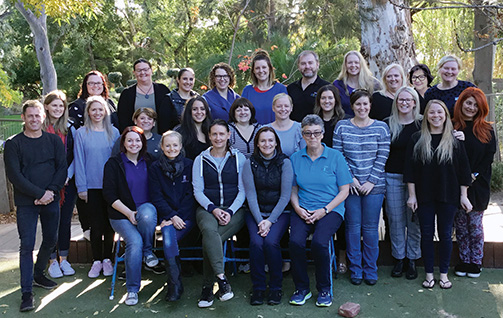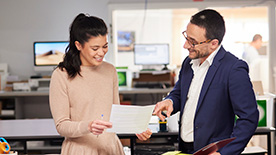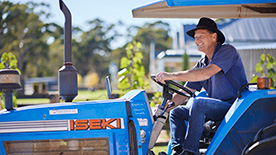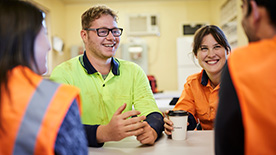Return to work coordinator profile - Joanne Waterhouse
 Houda Peters, our Employer Education Advisor, visited with Joanne of Margaret Ives Children’s Centre following her completion of the Return to Work Coordinator training. In addition to establishing supportive RTW processes, Houda was incredibly impressed by the Centre’s commitment to staff wellbeing, and the initiatives being delivered to ensuring a mentally healthy workplace, and cultivating a culture of care amongst the Organisation – including involvement from Parents.
Houda Peters, our Employer Education Advisor, visited with Joanne of Margaret Ives Children’s Centre following her completion of the Return to Work Coordinator training. In addition to establishing supportive RTW processes, Houda was incredibly impressed by the Centre’s commitment to staff wellbeing, and the initiatives being delivered to ensuring a mentally healthy workplace, and cultivating a culture of care amongst the Organisation – including involvement from Parents.
Name: Joanne Waterhouse
Position: Director
Organisation: Margaret Ives Children’s Centre

Margaret Ives Community Children’s Centre is a community based, not-for-profit childcare centre with a government funded preschool. We pride ourselves on providing a safe, secure, caring and stimulating environment for our children, families and staff. The health, safety and wellbeing of each of our children and staff members is paramount. One of the most important assets at Margaret Ives is our caring, experienced and enthusiastic staff team. Margaret Ives commits to providing our employees with a safe, healthy and supportive environment by valuing each individual employee’s input/opinion, encouraging a culture that supports healthy lifestyle choices and recognising each employee as an individual and striving to meet their needs.
We have a high educator-to-child ratio and qualified educators in each room. We are committed to professional and personal staff development - we believe it is integral to providing a high-quality service. We have 26 staff members employed currently at Margaret Ives on a permanent basis and then a relief team of 9 educators, many of our staff have been at the Centre for more than 10 years. Our longest standing members of staff are, Anne, who is an educator in our baby room, she started working for Margaret Ives in 1979, a year after the centre opened and Michelle our Administrator celebrated her 30-year anniversary in November this year.
What prompted Margaret Ives Children’s Centre to become more proactive in the wellbeing of staff?
Wellbeing is always high on the agenda in early childhood but especially so over the last few years, there is lots of incredibly great professional development out there and this has enabled people to become more knowledgeable and understanding in this area. In order for educators to fully support our children’s health and wellbeing we knew we must ensure our own health and wellbeing is ok first. The management team at Margaret Ives is very conscious of ensuring our staff are supported, but they are equally as great at supporting each other too. We are incredibly lucky to have such a caring and empathetic group of people working together to support each other.
At Margaret Ives, a great focus over this last twelve months has been on ensuring that our practice is informed by critical reflection and exploring what this means. We have different arenas where collegial reflection takes place; through collaborative team dialogue sessions split in the three rooms, through whole Centre reflection sessions, Leadership Meetings and within our Governing Committee Meetings.
Within strategic planning sessions and through our Centre Quality Improvement Plan we identified areas of development and targets in specific areas. Over time, we have developed our ten professional learning communities (PLCs). Within each PLC is a representative from each of our three rooms so they can feedback and represent all age groups and levels of development and also parent representatives, some who have a particular interest or work in that area. The PLC representatives are people who feel particularly passionate about their chosen area and feel that this is their area of specialty. I believe that through the PLCs we are creating leaders, and not in a general sense, but leaders of specialist areas of work, people who are passionate and who will be the driving forces behind big pieces of work. This is how our Wellbeing PLC came about.
Can you tell us about your current wellbeing program and some of the key initiatives?
At Margaret Ives wellbeing is high on the agenda for everyone – a big part of the focus of the Wellbeing PLC is on staff wellness. Initially we spoke to staff about how they felt their wellbeing was supported at Margaret Ives, we reviewed our wellness policy and we spent time researching what wellbeing is and what areas we needed to improve on. We created a calendar of events and activities which included; an information session from a medical professional (one of our parents) in women’s health issues, social events, weekend walks around South Australia, exercise classes after work, different challenges including a step challenge and a stop/start challenge, professional development and we created leaflets and posters on taking care of yourself during the winter months.
Our staff wellness package includes; $100 per year to contribute to each individual’s personal wellbeing, 3 days wellbeing leave over the Christmas closure break, training and development to be offered throughout the year, accessibility to 3 sessions with a psychologist per year and access to the annual Margaret Ives wellbeing calendar.
In 2019 we are moving forward with our plans to get a Margaret Ives Therapy Dog in the future and we want to continue our work with the BE YOU framework (formerly KidsMatter).
We ask in return that our staff take their assigned annual leave throughout the year, that theylook after themselves and stay home when they become ill, keep up to date and access any training and development and access all of the wonderful and supportive wellbeing opportunities that Margaret Ives offers yearly.
Can you tell us about the impact that your wellbeing program has had on the workplace?
I believe we have developed a culture where people check in with each other if they notice they seem out of sorts. Staff at Margaret Ives are mental health aware and are able to signpost their colleagues to different support services or chat to a Wellbeing Officer or RTW Officer. Staff understand what helps them feel good and have access to the things to support their wellbeing. A big thing for the staff is being able to stay at home when they are ill and not feel guilty about it – this is encouraged.
How has undertaking the RTW Coordinator training recently helped you realise the connection between workplace wellbeing and improved RTW outcomes?
There isn’t one without the other, if people don’t feel good mentally and don’t feel like they have a supportive workplace then they won’t want to be there. Having a good system of things in place and a supportive understanding team of employees, including management, will mean that if someone unfortunately gets injured at work, they will be proactive on making that return.
What advice would you give to other Return to Work Coordinators and/or Organisations who may be considering the development of a wellbeing program?
It is absolutely essential! Not only is it of benefit to the employees but it is crucial for running your business well. If you have a robust wellbeing programme in place you will find people will take less time off work and they will work harder when they are there. A happy healthy supported workforce will lead to a thriving business.
Thank you for your time Jo!






 Date printed: 01 Jul 2025
Date printed: 01 Jul 2025

